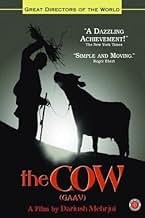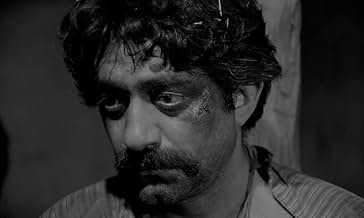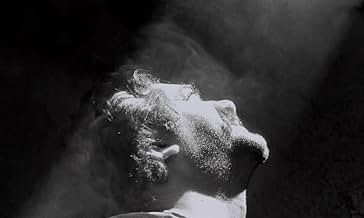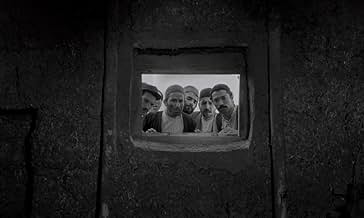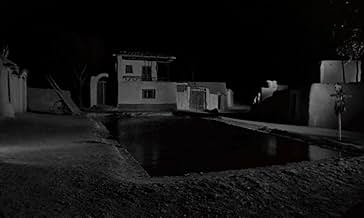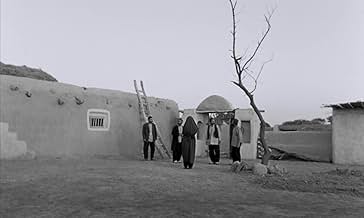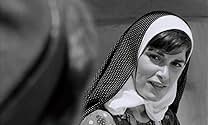AVALIAÇÃO DA IMDb
7,8/10
8,5 mil
SUA AVALIAÇÃO
Adicionar um enredo no seu idiomaAn old villager deeply in love with his cow goes to the capital for a while. While he's there, the cow dies and now the villagers are afraid of his possible reaction to it when he returns.An old villager deeply in love with his cow goes to the capital for a while. While he's there, the cow dies and now the villagers are afraid of his possible reaction to it when he returns.An old villager deeply in love with his cow goes to the capital for a while. While he's there, the cow dies and now the villagers are afraid of his possible reaction to it when he returns.
- Direção
- Roteiristas
- Artistas
- Prêmios
- 2 vitórias e 1 indicação no total
- Direção
- Roteiristas
- Elenco e equipe completos
- Produção, bilheteria e muito mais no IMDbPro
Avaliações em destaque
This movie is about as far as one can get from Hollywood blockbusters. Its about a cow. About a cow and a very loving owner. And what happens to them ultimately. There's melancholy and madness in the tragic ending. But the movie also scales new heights in the bonding between human and animals, in this case, a cow. The camera has been used is a surreal way. Shadows and people mix creating a spookiness which adds to the oddity of the general environment depicted. There's very palpable tension in the movie, created by the elements related to the cow and the three shadowy thieves who perhaps symbolize lawlessness. What also struck me was the looming silence of the black burkah-clad women and occasion glimpses of their crinkly faces. All very surreal. There are some very interesting personalities which come alive through the script, other than the cow of course!
This is a major work of cinema. It might not be well known but this film ranks with Fellini's "La Strada", De Sica's "The Bicycle Thief," or Mrinal Sen's "Oka Oori Katha" based on Premchand's story--"Coffin." Why is it a major work? A UCLA graduate makes a film far removed from Hollywood approaches to cinema in Iran during the Shah's regime. The film was made 10 years before Shah quit Iran and was promptly banned. It was smuggled out of Iran to be shown at the Venice Film Festival to win an award, even without subtitles.
The film does not require subtitles. It's visual. It's simple. The story is set in a remote Iranian village, where owning a cow for subsistence is a sign of prosperity. The barren landscape (true of a large part of Iran) reminds you of Grigory Kozintsev's film landscapes as in "Korol Lir" (the Russian King Lear) where the landscape becomes a character of the story.
The sudden unnatural death of the cow unsettles the village. Hassan, the owner of the cow, who nursed it as his own child, is away and would be shocked on his return. Eslam, the smartest among the villagers, devise a plan to bury the cow and not tell the poor man the truth. Hassan returns home and is soon so shocked that he loses his senses. He first imagines that the cow is still there and ultimately his sickness deteriorates as he imagines himself to be the cow, eats hay, and says "Hassan" his master will protect him from marauding Bolouris (bandits from another village). Eslam realizes that Hassan needs medical attention and decides to take him to the nearest hospital. He is dragged out like a cow. "Hassan" is beaten as an animal as he is not cooperative to the shock of some humanistic villagers. The demented Hassan, with the force of an animal breaks free, to seek his only freedom from reality--death.
The film stuns you. Forget Iran, forget the cow. Replace the scenario with any person close to his earthly possessions and what happens when that person is suddenly deprived of them and you will get inside the characters as Fellini, De Sica or Sen demonstrated in their cinema.
Every frame of the film is carefully chosen. The realism afforded by the story will grip any sensitive viewer. There is a visually arresting use of a small window in the wall of the cowshed through which the villagers watch the goings on within the cowshed. The directors use of the window serves two purposes--it gives the villagers a perspective of the cowshed and the viewer a perspective of the cowshed watchers.
The film is also a great essay on the effects of hiding truth from society and the cascading fallouts of such actions.
But there is more. Director Mehrjui affords layers of meaning to his "simplistic" cinema. There is veiled criticism of blind aspects religious rituals (Shia Islam), a critical look of stupid villagers dealing with their village idiots, the jealous neighbors, the indifferent neighbors, the village thief--all elements of life around us, not limited to a village in Iran. The political layering is not merely limited to the poverty but the politics of hiding truth and the long term effect it has on society. Ironically, there are values among the poorest of the poor--the hide of a "poisoned?" animal cannot be sold!
I was lucky to catch up with the rare screening of this film at the on-going International Film Festival of Kerala, India, that devoted a retrospective section of early Iranian cinema.
This is a film that should make Iran proud. It is truly a gift to world cinema.
The film does not require subtitles. It's visual. It's simple. The story is set in a remote Iranian village, where owning a cow for subsistence is a sign of prosperity. The barren landscape (true of a large part of Iran) reminds you of Grigory Kozintsev's film landscapes as in "Korol Lir" (the Russian King Lear) where the landscape becomes a character of the story.
The sudden unnatural death of the cow unsettles the village. Hassan, the owner of the cow, who nursed it as his own child, is away and would be shocked on his return. Eslam, the smartest among the villagers, devise a plan to bury the cow and not tell the poor man the truth. Hassan returns home and is soon so shocked that he loses his senses. He first imagines that the cow is still there and ultimately his sickness deteriorates as he imagines himself to be the cow, eats hay, and says "Hassan" his master will protect him from marauding Bolouris (bandits from another village). Eslam realizes that Hassan needs medical attention and decides to take him to the nearest hospital. He is dragged out like a cow. "Hassan" is beaten as an animal as he is not cooperative to the shock of some humanistic villagers. The demented Hassan, with the force of an animal breaks free, to seek his only freedom from reality--death.
The film stuns you. Forget Iran, forget the cow. Replace the scenario with any person close to his earthly possessions and what happens when that person is suddenly deprived of them and you will get inside the characters as Fellini, De Sica or Sen demonstrated in their cinema.
Every frame of the film is carefully chosen. The realism afforded by the story will grip any sensitive viewer. There is a visually arresting use of a small window in the wall of the cowshed through which the villagers watch the goings on within the cowshed. The directors use of the window serves two purposes--it gives the villagers a perspective of the cowshed and the viewer a perspective of the cowshed watchers.
The film is also a great essay on the effects of hiding truth from society and the cascading fallouts of such actions.
But there is more. Director Mehrjui affords layers of meaning to his "simplistic" cinema. There is veiled criticism of blind aspects religious rituals (Shia Islam), a critical look of stupid villagers dealing with their village idiots, the jealous neighbors, the indifferent neighbors, the village thief--all elements of life around us, not limited to a village in Iran. The political layering is not merely limited to the poverty but the politics of hiding truth and the long term effect it has on society. Ironically, there are values among the poorest of the poor--the hide of a "poisoned?" animal cannot be sold!
I was lucky to catch up with the rare screening of this film at the on-going International Film Festival of Kerala, India, that devoted a retrospective section of early Iranian cinema.
This is a film that should make Iran proud. It is truly a gift to world cinema.
this film from 1960s and we should attend this masterpiece about a man and his life his problems his troubles we can discuses about influence of this film on thinking of people about human and all around things we can discuss about importance this movie to in Iranian cinema in 40 years ago and it director and actors are some of best of cinema history this film from 1960s and we should attend this masterpiece about a man and his life his problems his troubles we can discuses about influence of this film on thinking of people about human and all around things we can discuss about importance this movie to in Iranian cinema in 40 years ago and it director and actors are some of best of cinema history
In the small village where he lives, Masht Hassan is well-known because he owns the only cow. Needless to say he is very protective of the animal and treats it like the child he and his wife do not have bathing, feeding and playing with it; his main worry is that the neighbouring Boulouris will come in the night and steal it away. However while he is away one day, the cow starts to bleed from the nose and die faced with having to tell him it is dead, the villagers bury the body and agree to tell him it has strayed. When Hassan returns he cannot believe it and soon is spending nights on the roof of the barn waiting for it to return, part of a gradual spiral downwards with no end Considered to be one of the landmark films in the history of Iran as a force as a film producing nation, this will be a harder sell to Western audiences (myself included) who perhaps cannot understand the context of the story and some of the deeper meaning that, I assume, this story has. The plot is simple and it seems to show the mental decline of Hassan and the village's collective inability to deal with that within the confines of daily life. In painting a realistic picture of village life (the film was shot using a mix of actors and real villagers) the film maintains an interesting setting even if the development is rather slow and unsatisfying. It requires you to think of course, but I didn't think I had the knowledge to really appreciate it and I suspect that many other viewers will struggle for the same reason.
The stark direction is good but I'm not sure if it suited the material as I would have preferred a washed out colour to compliment the sentiment in the film. It worked though and the performances are mainly good Entezami in particular convincing in his slide into instability. Worth seeing because of its stature within Iranian cinema then, but perhaps you need a greater understanding of the culture than I if you are to take more from it. Even still it is interesting in its view of village life and the attitude towards mental illness.
The stark direction is good but I'm not sure if it suited the material as I would have preferred a washed out colour to compliment the sentiment in the film. It worked though and the performances are mainly good Entezami in particular convincing in his slide into instability. Worth seeing because of its stature within Iranian cinema then, but perhaps you need a greater understanding of the culture than I if you are to take more from it. Even still it is interesting in its view of village life and the attitude towards mental illness.
Very primitive. Villagers don't speak, they take turns, as if on cue, to SHOUT their lines at the top of their lungs, and in a pronounced Tehrani accent at that. The incessant SHOUTING gets annoying real fast.
What makes things worse is that the sound level is the same regardless of the actors' distances from the scene. Someone shouting from the top of a roof several houses away is as loud as someone standing next to you. If you don't look at the screen, you will get the feeling that all actors are standing around a single microphone and shouting into it.
This could have been a much better movie in the hands of a more experienced director and crew but as it is, I couldn't stand it. Fast-forwarded through.
What makes things worse is that the sound level is the same regardless of the actors' distances from the scene. Someone shouting from the top of a roof several houses away is as loud as someone standing next to you. If you don't look at the screen, you will get the feeling that all actors are standing around a single microphone and shouting into it.
This could have been a much better movie in the hands of a more experienced director and crew but as it is, I couldn't stand it. Fast-forwarded through.
Você sabia?
- CuriosidadesFinanced largely by the Shah's government, the producers were aghast at the finished film as they felt that it made Iran look like it was a completely backwards country. The film was only allowed to be released with a disclaimer attached stating that the events depicted happened long before the then existing regime.
- Erros de gravaçãoWhen a woman goes to Mash Hassan to get milk, a man tells her that one cow is all they have in the village. This should be impossible because a female cow cannot get pregnant on her own and lactate.
- Citações
Masht Hassan: I'm not Hassan. I'm his cow.
- ConexõesFeatured in Cinema Iran (2005)
Principais escolhas
Faça login para avaliar e ver a lista de recomendações personalizadas
- How long is The Cow?Fornecido pela Alexa
Detalhes
- Data de lançamento
- País de origem
- Centrais de atendimento oficiais
- Idioma
- Também conhecido como
- The Cow
- Locações de filme
- Empresa de produção
- Consulte mais créditos da empresa na IMDbPro
- Tempo de duração
- 1 h 44 min(104 min)
- Cor
- Mixagem de som
- Proporção
- 1.37 : 1
Contribua para esta página
Sugerir uma alteração ou adicionar conteúdo ausente

